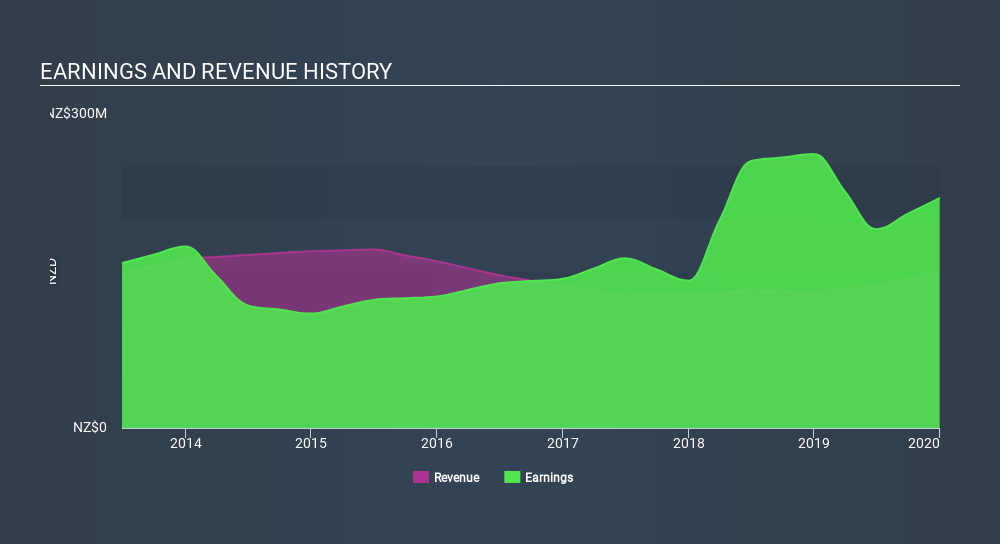- New Zealand
- /
- Office REITs
- /
- NZSE:PCT
Could The Precinct Properties New Zealand Limited (NZSE:PCT) Ownership Structure Tell Us Something Useful?

Every investor in Precinct Properties New Zealand Limited (NZSE:PCT) should be aware of the most powerful shareholder groups. Generally speaking, as a company grows, institutions will increase their ownership. Conversely, insiders often decrease their ownership over time. Companies that used to be publicly owned tend to have lower insider ownership.
Precinct Properties New Zealand isn't enormous, but it's not particularly small either. It has a market capitalization of NZ$2.1b, which means it would generally expect to see some institutions on the share registry. Taking a look at our data on the ownership groups (below), it's seems that institutions own shares in the company. Let's take a closer look to see what the different types of shareholder can tell us about Precinct Properties New Zealand.
Check out our latest analysis for Precinct Properties New Zealand

What Does The Institutional Ownership Tell Us About Precinct Properties New Zealand?
Institutions typically measure themselves against a benchmark when reporting to their own investors, so they often become more enthusiastic about a stock once it's included in a major index. We would expect most companies to have some institutions on the register, especially if they are growing.
As you can see, institutional investors own 54% of Precinct Properties New Zealand. This suggests some credibility amongst professional investors. But we can't rely on that fact alone, since institutions make bad investments sometimes, just like everyone does. When multiple institutions own a stock, there's always a risk that they are in a 'crowded trade'. When such a trade goes wrong, multiple parties may compete to sell stock fast. This risk is higher in a company without a history of growth. You can see Precinct Properties New Zealand's historic earnings and revenue, below, but keep in mind there's always more to the story.

Since institutional investors own more than half the issued stock, the board will likely have to pay attention to their preferences. Precinct Properties New Zealand is not owned by hedge funds. Our data shows that AMP Capital Investors Limited is the largest shareholder with 20% of shares outstanding. Next, we have ANZ New Zealand Investments Limited and Accident Compensation Corporation, Asset Management Arm as the second and third largest shareholders, holding 13% and 5.0%, of the shares outstanding, respectively.
Further, we can found that 51% of the ownership is controlled by the top 11 shareholders, meaning that no one shareholder has a majority interest in the ownership.
While it makes sense to study institutional ownership data for a company, it also makes sense to study analyst sentiments to know which way the wind is blowing. There are a reasonable number of analysts covering the stock, so it might be useful to find out their aggregate view on the future.
Insider Ownership Of Precinct Properties New Zealand
While the precise definition of an insider can be subjective, almost everyone considers board members to be insiders. The company management answer to the board; and the latter should represent the interests of shareholders. Notably, sometimes top-level managers are on the board, themselves.
I generally consider insider ownership to be a good thing. However, on some occasions it makes it more difficult for other shareholders to hold the board accountable for decisions.
Our most recent data indicates that insiders own less than 1% of Precinct Properties New Zealand Limited. It's a big company, so even a small proportional interest can create alignment between the board and shareholders. In this case insiders own NZ$6.4m worth of shares. Arguably, recent buying and selling is just as important to consider. You can click here to see if insiders have been buying or selling.
General Public Ownership
The general public, with a 46% stake in the company, will not easily be ignored. While this group can't necessarily call the shots, it can certainly have a real influence on how the company is run.
Next Steps:
It's always worth thinking about the different groups who own shares in a company. But to understand Precinct Properties New Zealand better, we need to consider many other factors. Case in point: We've spotted 4 warning signs for Precinct Properties New Zealand you should be aware of, and 2 of them make us uncomfortable.
If you are like me, you may want to think about whether this company will grow or shrink. Luckily, you can check this free report showing analyst forecasts for its future.
NB: Figures in this article are calculated using data from the last twelve months, which refer to the 12-month period ending on the last date of the month the financial statement is dated. This may not be consistent with full year annual report figures.
If you spot an error that warrants correction, please contact the editor at editorial-team@simplywallst.com. This article by Simply Wall St is general in nature. It does not constitute a recommendation to buy or sell any stock, and does not take account of your objectives, or your financial situation. Simply Wall St has no position in the stocks mentioned.
We aim to bring you long-term focused research analysis driven by fundamental data. Note that our analysis may not factor in the latest price-sensitive company announcements or qualitative material. Thank you for reading.
About NZSE:PCT
Precinct Properties NZ & Precinct Properties Investments
Listed on the NZX Main Board under the ticker code PCT and ranked in the NZX top 30, Precinct is the largest owner, manager and developer of premium city centre real estate in Auckland and Wellington.
Average dividend payer with moderate growth potential.
Market Insights
Community Narratives



